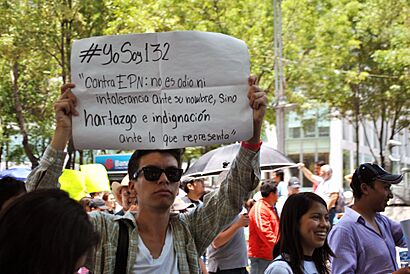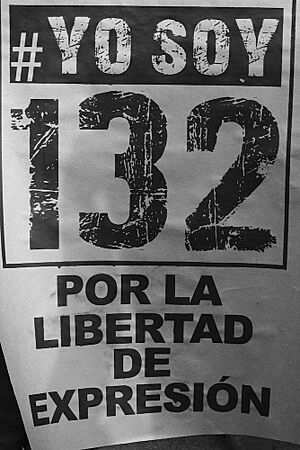Yo Soy 132 facts for kids
Quick facts for kids Yo Soy 132 |
|
|---|---|
| Part of the 2012 Mexican general election, Impact of the Arab Spring | |

Poster stating #YoSoy132 against EPN: it's not hate nor intolerance against his name, but rather being full of indignation as to what he represents
|
|
| Date | 15 May 2012 –2013 |
| Location |
Mexico
|
| Caused by |
|
| Goals |
|
| Methods | |
| Resulted in |
|
Yo Soy 132, also known as #YoSoy132, was a student protest movement in Mexico. It included university students from both private and public schools. People from about 50 cities around the world also supported it.
The movement started because students were unhappy with Enrique Peña Nieto. He was a candidate for president from the Institutional Revolutionary Party (PRI). They also felt that Mexican news channels were not fair in how they reported on the 2012 Mexican general election.
The name Yo Soy 132 means "I Am 132" in Spanish. It came from showing support for the first 131 students who started the protest. The movement was inspired by other protests like the Occupy movement and the Spanish 15-M movement. Some people called it the "Mexican spring" or the "Mexican occupy movement."
How the Yo Soy 132 Movement Started
On May 11, 2012, Enrique Peña Nieto visited the Ibero-American University. He was running for president at the time. He was there to talk about his plans to the students.
At the end of his talk, some students asked him about an event from 2006. This event involved protests in San Salvador Atenco. Peña Nieto, who was governor then, had sent police to stop the protests. This led to some people being hurt or arrested.
Peña Nieto said that sending the police was a strong action. He said it helped bring back order and peace. He also said that the highest court in Mexico found his actions to be valid. Some people in the audience clapped for him. Other students, however, showed they did not like his answer.
Students recorded the event and put the videos online. But major Mexican TV channels and newspapers reported that the protest was not by students from that university. This made many Ibero-American University students upset.
Because of this, 131 students made a video. They showed their student ID cards to prove who they were. This video quickly became very popular online. Soon, protests began on many other university campuses. People showed their support for the 131 students. They did this by saying, "I am 132," especially on Twitter. This is how the Yo Soy 132 movement began.
What the Movement Wanted
On June 5, 2012, students met at the National Autonomous University of Mexico (UNAM). This is Mexico's largest public university. They decided that the movement should continue even after the election. They wanted it to become a strong force across the country.
The Yo Soy 132 movement had several goals:
- They wanted news channels to cover elections more fairly.
- They wanted the presidential debates to be shown on TV for everyone to see.
- They hoped for more democracy in Mexico.
- They also wanted big political changes in the country.
The movement saw some success. For example, the second Mexican presidential debate was shown nationwide. However, the channels that showed it were ones the movement had called unfair before. The movement also tried to organize a third debate. Enrique Peña Nieto did not attend this debate.
See also
- National Regeneration Movement
- 2012 Mexican elections protests
- 1DMX riots
- Peña's birthday present
- SEDENAs website deface
- Mexican Indignados Movement
- List of protests in the 21st century
 | Emma Amos |
 | Edward Mitchell Bannister |
 | Larry D. Alexander |
 | Ernie Barnes |


